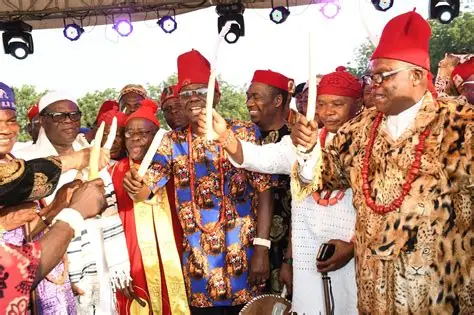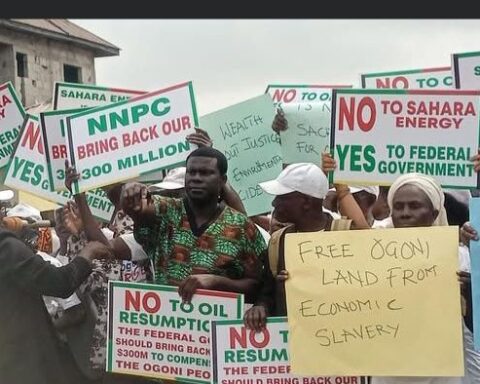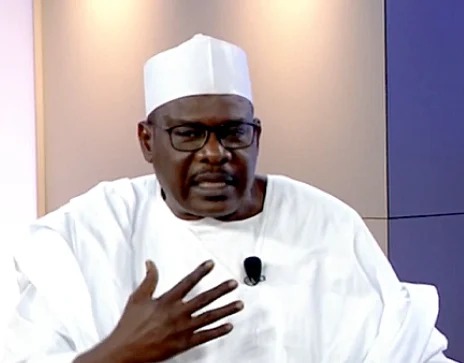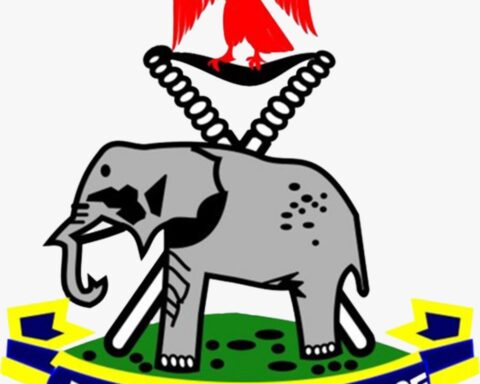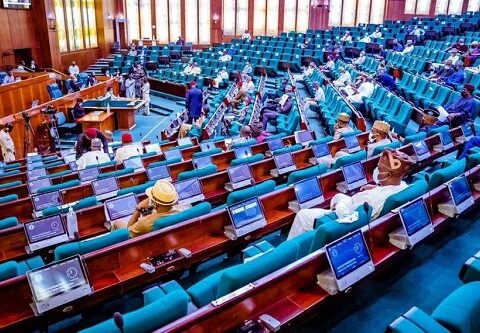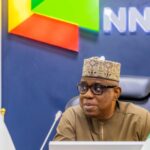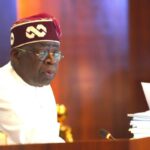NDIGBO LAGOS, the coordinating body representing all Igbo organizations within Lagos State and its environs, issues this statement to reaffirm the values that define our people and our place in this great city. Considering recent ethnic unease and divisive rhetoric, we speak not in defiance, but in dignity—to remind Lagos, Nigeria, and the world of who we are, where we come from, and what we have always stood for.
We are Ndigbo—not just a people, but a philosophy. We are shaped by the enduring rhythm of our spirit, anchored in the sacred soil of Igboland. Our relationship with our homeland is spiritual and eternal. Though we journey everywhere—living, working, and thriving in Lagos and across the globe—we stay tethered to our roots. Our story is not one of dislocation, but of dispersion with purpose. Migration, for us, is not a departure—it is an extension of our identity.
In Lagos, our presence predates independence. From Surulere to FESTAC, Ajegunle to Ikeja, we have built homes, schools, markets, and faith centres that enrich the city’s multicultural identity. We are guests— but we are stakeholders. Our contributions are woven into the city’s fabric, as builders, investors, educators, and peacemakers.
NDIGBO LAGOS has over the years partnered extensively with the Lagos State Government and its communities. We have facilitated sanitation campaigns, sponsored scholarships regardless of ethnicity, provided emergency relief, revived local markets, and championed grassroots development. Our ethic of service is rooted in our spiritual and moral principle:
Ọ bịara nga Ònye, abiagbuna ya, ọlawa nkpukpu apụ la ya
He who lives in another man’s land must not take advantage of them, and when he leaves, must go in peace.
We do not conquer—we cultivate and grow. Every land we enter, we help in its transformation. We leave no place as we met it, because it is in our nature to contribute, to improve, and to uplift. But our compass always points home—to Igboland, where our names echo in the soil and our spirits rest.
In this spirit, we express concern over symbolic gestures targeting our history—such as the recent renaming of streets bearing Igbo legacies. We understand these may stem from policy decisions, but the implications are deeply felt. Civic memory is not an administrative detail—it is the heartbeat of inclusion. To erase names is to blur histories. We urge reflection, not retaliation.
The “Igbo takeover” narrative is a baseless political and ethnic gimmick. It is a fabricated, dangerous trope designed to incite fear and animosity. This false narrative is not only corrosive but also undermines decades of collaborative efforts and peaceful coexistence. The Igbo people are not a threat to be feared; they are a vital part of the nation’s progress, contributing to the development of the communities they inhabit through hard work and collaboration.
We also wish to address the persistent and politically charged claim that the phrase “Lagos is a no man’s land” originated from the Igbo community to undermine Yoruba heritage. This narrative is not only historically inaccurate—it is a deliberate distortion designed to inflame ethnic tensions and sow division. The phrase, in its original context, was attributed to Jaja Anucha Wachuku, an Igbo statesman and Nigeria’s first Speaker of the House of Representatives, who in the 1940s described Lagos as a “no man’s land” in reference to its status as the Federal Capital Territory. His intent was not to deny Yoruba ownership or heritage, but to articulate a vision of Lagos as a cosmopolitan and inclusive city—a national space where all Nigerians, regardless of origin, could live, work, and thrive.
This inclusive ideal was not exclusive to Wachuku. Prominent Yoruba figures, including Lateef Jakande, Lagos’s first civilian governor, echoed similar sentiments in his 1979 inaugural address, celebrating the city’s diversity and the contributions of all ethnic groups to its development. The idea was clear: Lagos, while rooted in Yoruba history, had grown into a shared civic space—a model for national unity.
Unfortunately, in recent years, this phrase has been weaponised by political opportunists and ethnic chauvinists to falsely portray the Igbo community as hostile to Yoruba identity. This misuse is not only intellectually dishonest—it is corrosive to the spirit of coexistence that has defined Lagos for decades. The original context of “no man’s land” was a call for inclusion, not erasure. It was a hope that Lagos could embody the best of Nigeria—a city where diversity is not feared but embraced.
We urge all parties to resist the temptation of historical revisionism and to honour the truth: Lagos has always been a city of many peoples, and its strength lies in that plurality.
OUR APPEAL
TO NDIGBO IN LAGOS:
Stand tall in the legacy of our forebears—builders, traders, thinkers, and peacemakers. Let your response to provocation be measured, not reactive. Grace, industry, and quiet strength have always been our hallmarks. Do not be drawn into the traps of malicious baiting or inflammatory rhetoric. Those who seek to provoke you often do so from a place of fear engendered by ignorance is who you are, not strength.
Remember the wisdom of our ancestors: “He who is surrounded by enemies guards himself cautiously.” This is not a call to paranoia, but to prudence. In times of tension, let your words be few and your actions deliberate. Let your success speak louder than any insult. Let your dignity disarm hostility.
Tone down the rhetoric. Resist the urge to match fire with fire. Our power lies not in noise, but in quiet excellence—in the markets we build, the homes we nurture, the children we raise, and the peace we uphold. Let your presence in Lagos continue to be a testament to resilience and contribution, not conflict.
We are guests— but we are also stakeholders. And even stakeholders must sometimes walk with caution, this is the time. Let your character be your shield, and your legacy your compass.
TO OUR YORUBA NEIGHBOURS:
We are neighbours, not rivals. Let us not allow the noise of politics to drown the quiet truth of our shared history. Across generations, Yoruba and Igbo families have intermarried, built businesses together, raised children side by side, and stood shoulder to shoulder in moments of national crisis. These bridges—woven through kinship, commerce, and community—are too sacred to be torn down by fleeting provocations.
Let us protect what our ancestors built. Let us honor the spirit of omoluabi and nwanne—values that speak to integrity, empathy, and kinship. The future of Lagos depends not on division, but on collaboration. We must choose dialogue over discord, and mutual respect over mutual suspicion.
TO LAGOS STATE GOVERNMENT:
Inclusive governance is not a concession—it is a mark of courage and maturity. Lagos thrives because it is a mosaic of cultures, not a monolith. Revisiting policies or gestures that alienate any segment of its population will not be seen as weakness, but as wisdom. Leadership is tested not in moments of ease, but in moments of tension.
We urge the government to rise above the fray and reaffirm its commitment to every Lagosian—regardless of origin. Let the state be a model of unity in diversity, where every citizen feels seen, heard, and valued. That is the Lagos the world admires. That is the Lagos history will remember.
TO SOUTH-EAST POLITICAL LEADERS:
Visibility is not vanity—it is responsibility. In moments like these, silence is not neutrality; it is absence. Lagos is home to millions of your citizens. Their welfare, dignity, and rights must be actively protected and diplomatically advanced.
Be present. Be strategic. Engage with Lagos leadership, civil society, and the media. Let your advocacy be firm but respectful, principled but pragmatic. Your voice must echo not just in Enugu or Awka, but in Alausa and Ikeja. Leadership is not only about what happens at home—it is about where your people live, work, and dream.
TO IGBO LEADERSHIP IN THE DIASPORA:
Your voice carries weight. Use it wisely. Build coalitions across ethnic and regional lines. Promote unity not just among Ndigbo, but among all Nigerians in the diaspora. Let your public statements be guided by restraint, clarity, and strategic foresight.
In times of tension, the world watches. Let our diaspora be known not for reactionary outbursts, but for thoughtful engagement. Speak with purpose. Act with discipline. Influence with wisdom. The global Igbo voice must be a force for peace, progress, and principled advocacy.
PATHWAYS TO PEACE AND PROGRESS
- Empower an Inter-Ethnic Peace Council to mediate, watch, and advise during moments of tension.
- Institutionalise Cultural Exchange Programs to build mutual understanding among youth.
- Launch Cross-Tribal Development Projects that unify rather than divide.
- Celebrate All Ethnic Contributions through civic honours and inclusive commemorations.
IN CONCLUSION
Lagos is a city of dreams. And we, Ndigbo, are part of that dream. We did not arrive—we have been here long enough to be seen. Let temporary tensions not spoil eternal ties. Let no political misstep destroy decades of unity. Let Lagos rise—not in division, but in dignity.
